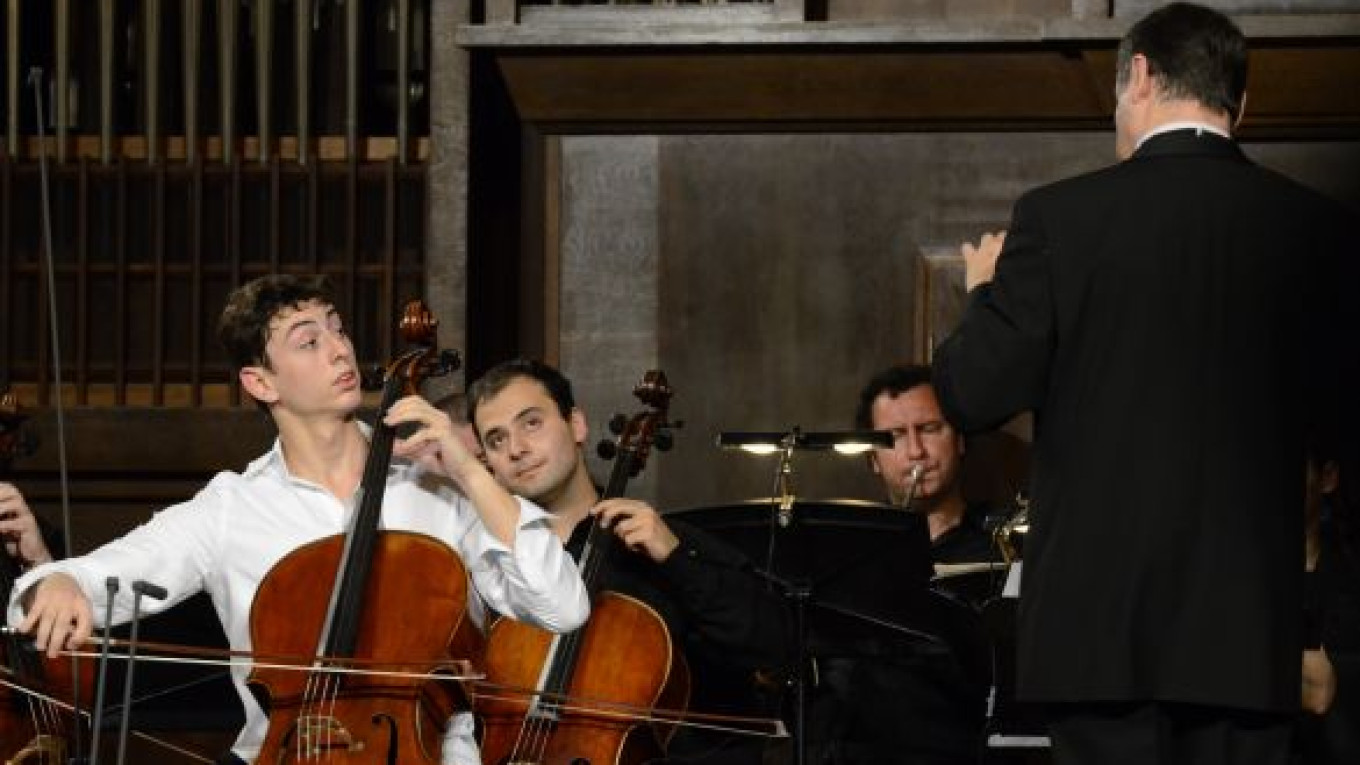The 14th International Tchaikovsky Competition reached its conclusion over the weekend with concerts in Moscow and St. Petersburg featuring 14 of its 19 prize-winning pianists, violinists, cellists and vocalists.
Over the past two decades, the competition has suffered an enormous decline in prestige. This time around, the Culture Ministry made an all-out effort to arrest that decline, appointing the country’s most influential musician, Mariinsky Theater boss Valery Gergiev, as competition chairman, hiring an experienced competition manager from the United States, instituting new jury voting rules and filling the juries with prominent performing musicians — rather than the professors who have dominated them in the recent past — and severely reducing the number of competitors.
More controversially, half the competition — the violin and vocal contests — was moved to St. Petersburg, ostensibly because of a possible delay in completing renovation of the Great Hall of the Moscow Conservatory, but more likely, in the view of many observers, the result of Maestro Gergiev’s desire to see a part of the competition take place within his musical empire on the Neva.
Keeping up with all four competition contests proved, as always, a practical impossibility. And though the entire competition was streamed live over the Internet, I found time to watch very little of the contests in St. Petersburg. Even in Moscow, I found myself eventually concentrating on the cellists, while only intermittently paying attention to the pianists.
As for the cellists, they seemed as a group to be the most talented of all. And at various times along the way I picked six or seven as potential first-prize winners. In the end, the jury made what seemed a “safe” choice, 22-year-old Armenian Narek Hakhnazaryan. Hakhnazaryan performed extremely well throughout, but I found much more to cheer about in the ethereal sounds produced by 17-year-old Frenchman Edgar Moreau, who took second prize, and in the superbly communicative playing of 30-year-old Italian Umberto Clerici, who seemed rather unjustly awarded fifth prize.
The Tchaikovsky Competition would not be the Tchaikovsky Competition without out at least one good scandal. This year’s was no exception. As conductor for the third round of the cello contest, the organizers inexplicably chose Mark Gorenstein, somehow overlooking the fact or unaware that his conducting proved a hindrance rather than a help to the piano finalists at the last two competitions.
Following a rehearsal with Hakhnazaryan, Gorenstein was heard, via the Internet, to make a derogatory remark about the cellist, including a crude reference to his ethnic origin. The organizing committee issued an immediate rebuke, which brought an apology from Gorenstein, followed by his departure from the competition “due to illness” and replacement by a pair of capable young conductors from the Mariinsky Theater.
Taking first prize in piano was Russian Daniil Trifonov, 20, the third-prize winner at last year’s super-prestigious Chopin Piano Competition in Warsaw. For my part, I found his playing to range from fluent to routine and received much more pleasure listening to the two Koreans, female (Son Yeol-eum, 25) and male (Cho Seong-jin, 17), who respectively won second and third prize.
The violin jury blithely ignored a new competition rule requiring that a first prize always be awarded. Declining to hand out that prize, it went on to split second prize between Russian Sergei Dogadin, 22, and Israeli Itamar Zorman, 25.
Judged by the credentials of its 40 competitors, 22 of them from Russia and nine more from other former Soviet republics, the vocal competition looked unlikely to uncover much in the way of outstanding talent. And so it turned out, with the jury awarding only four of the eight prizes at its disposal, a first and third to the women — South Korean soprano Seo Sun-young, 27, and Stanislavsky and Nemirovich-Danchenko Musical Theater soprano intern Yelena Guseva, 25, respectively — and, in the case of the men, a first to South Korean bass Park Jong-min, 24, and a second to Mongolian baritone Amartuvshin Enkhbat, also 24.
As to whether this year’s Tchaikovsky Competition served to restore its prestige, the answer to that will depend on its prizewinners’ success, or lack thereof, on the world’s concert and operatic stages and on the quality of competitors that it attracts to its next installment in 2015.
Certainly this year’s competition was far better managed than its recent predecessors, while the level of playing, if not singing, proved at least marginally higher. But in the end I found myself wondering whether it was all really worthwhile. Surely there must be less complicated and less costly ways of uncovering and promoting young talent. But at the very least, the competition seems in need of a serious rethinking, perhaps with abolition of the vocal contest and separation of the rest into piano, on the one hand, and violin and cello, on the other, and alternating them at two-year intervals.
A Message from The Moscow Times:
Dear readers,
We are facing unprecedented challenges. Russia's Prosecutor General's Office has designated The Moscow Times as an "undesirable" organization, criminalizing our work and putting our staff at risk of prosecution. This follows our earlier unjust labeling as a "foreign agent."
These actions are direct attempts to silence independent journalism in Russia. The authorities claim our work "discredits the decisions of the Russian leadership." We see things differently: we strive to provide accurate, unbiased reporting on Russia.
We, the journalists of The Moscow Times, refuse to be silenced. But to continue our work, we need your help.
Your support, no matter how small, makes a world of difference. If you can, please support us monthly starting from just $2. It's quick to set up, and every contribution makes a significant impact.
By supporting The Moscow Times, you're defending open, independent journalism in the face of repression. Thank you for standing with us.
Remind me later.


